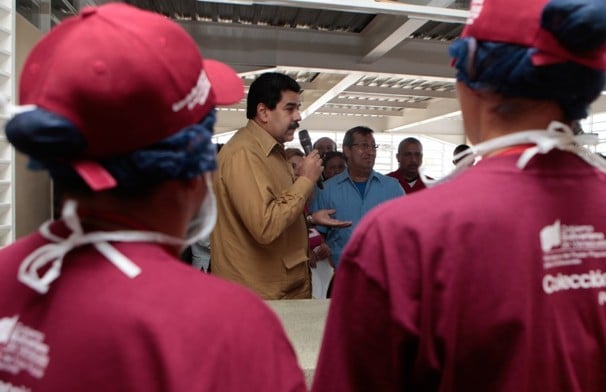
Nicolas Maduro (center with mic), Vice President of Venezuela, speaks to students at a school opening on Jan. 18, 2013. Maduro has become the visible face of the Venezuelan government with President Hugo Chavez not being seen for over a month after undergoing cancer treatment. It is unclear who will lead Venezuela going forward. Photo: Miraflores Press Office/Associated Press
Back in October during Venezuela’s presidential election, the health status of President Hugo Chavez–and its impact on his ability to lead the country–was unclear. Yet the president’s popularity won out and he was awarded another term.
Yet it has now been over a month since his last public appearance, after which Chavez underwent cancer surgery. He was supposed to be officially sworn in as president Jan. 10- that did not happen. Opposition groups have claimed the government violated the country’s constitution by postponing the inauguration indefinitely, but the Supreme Court (not surprisingly) dismissed this claim.
So with Chavez incognito, who’s running the show? Despite the absence of its leader the Chavez administration has taken steps to show it is still firmly in control. Vice President Nicolas Maduro has recently represented the government at several public events, duties normally carried out by Chavez (who has never been one to miss a good promotional opportunity). On January 18, 2013 Maduro helped open a school, visited an agricultural training center, and spoke to National Guard troops.
Chavez chose Maduro to be his successor in December, and now the vice president seems to be taking steps in that direction. But how much power Maduro has now, and/or would have if Chavez dies, remains very much a mystery.
The Venezuelan constitution mandates a presidential election be held within 30 days of the death of a sitting president. Such a scenario would likely pit Maduro against Henrique Capriles Radonski, whom Chavez defeated in last October’s election. Brazil’s leadership has made overtures for an election to be held as soon as possible after Chavez’s death to stave off potential political crisis and civil unrest.
Yet the Supreme Court’s recent ruling on postponing inauguration has increased concerns that the government will find a way around holding an election and shepherd Maduro directly into presidential office. It is also unknown how closely Maduro, whether elected or otherwise assuming power, would hue to Chavez’s socialist agenda. Chavez oversaw heavy public spending and complete government control of the country’s oil industry. Although acquiring an intensely following, his policies have led to an economy in major trouble– shrinking growth, high inflation, and unstable currency.
The opposition in Venezuela has criticized the current state of government affairs, describing Venezuela as a “headless country” where recent developments have “gravely affected the democratic order.” Interestingly, Capriles has been relatively quiet thus far on the situation and his potential role in an upcoming election should Chavez succumb to cancer.
So the soap opera that is the Venezuelan political situation rolls on, and no one knows how the drama will end. The country could be on the verge of a major shift in political leadership and ideology…or it could be more of the same.
A lot will be learned in the next few months about the nature of Venezuela’s democracy, and the extent to which it exists. Whoever ends up in the leadership role will have a much greater chance of maintaining peace and stability if democratic principles are followed.
FPA bloggers Richard Basas, Sean Goforth, and Melissa Lockhart Fortner have recently examined different aspects of Venezuela’s leadership dilemma. Check out their posts in Foreign Policy Blogs’ The Americas section.